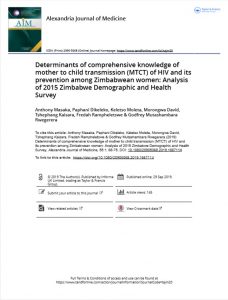
Introduction
The global burden of human immunodeficiency virus (HIV) infection/acquired immunodeficiency syndrome has significantly decreased; however, new HIV infections decline slowly; this poses challenges to achieve Sustainable Development Goal 3.3. Mother-to-child transmission (MTCT) of HIV contributes to about 6.4% of all new pediatric HIV infections in Zimbabwe. Women’s comprehensive knowledge of MTCT of HIV and its prevention is associated with poor utilization of MTCT services and therefore new pediatric HIV infections. We use Demographic and Health Survey (DHS) of 2015 to measure determinants of correct comprehensive knowledge of MTCT and prevention of mother-to-child transmission (PMTCT) of HIV in Zimbabwe.
Results
About 70.5% of women have correct comprehensive knowledge of MTCT and PMTCT. In multivariate logistic regression analysis, factors strongly associated with correct comprehensive knowledge were age of women (where 15–19 years have lower adjusted odds ratio [AOR] than other age groups), residing in Mashonaland central, Masvingo, Harare, and Bulawayo provinces (p < 0.005), and receiving posttest counseling after HIV test (AOR = 1.49, 95% confidence interval [CI] = 1.12–1.98, p = 0.007). However, Christian women were less likely to have such knowledge (AOR = 0.57, 95% CI = 0.37–0.88, p = 0.012).
Discussion
30% of women at reproductive age in Zimbabwe lack correct comprehensive knowledge of MTCT and its prevention. Such knowledge is associated with demographic factors such as age, religion, provinces, and receiving posttest counseling. The fact that MTCT of HIV still poses a challenge in the country, interventions toward the elimination of new newborn HIV infections should consider these factors.